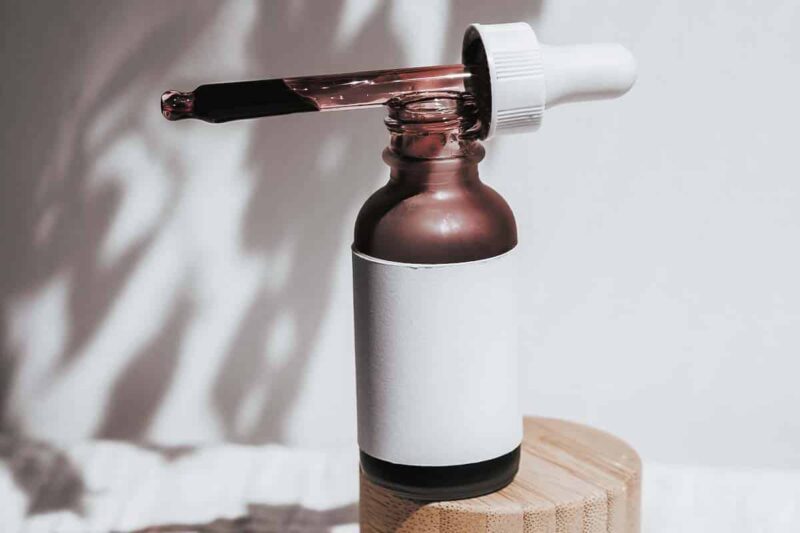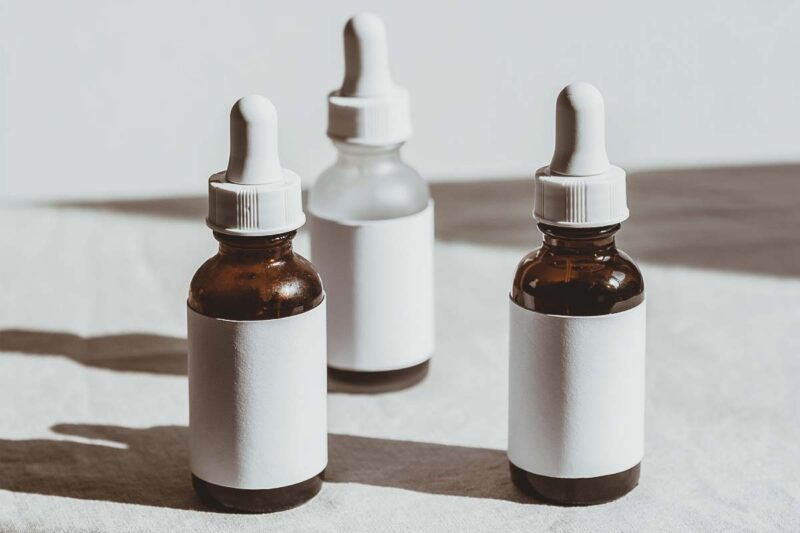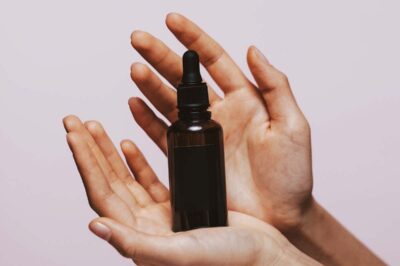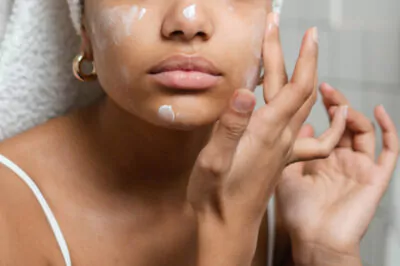Table of Contents[Hide][Show]
Sometimes the skin needs help, especially after long periods of overexposure to the sun, pregnancy or other factors. Vitamin C contains antioxidants, which help address many skin care concerns; that’s why many high-end skin care products—creams, serums and facial oils have this vitamin.
We are big on using quality ingredients and our personal vitamin C favorite is Tetrahexyldecyl ascorbate (THDA), which is the most stable form of vitamin C. It is also great for the skin before sinking into the dermis and epidermis. That is why we use THDA as the main ingredient in Brighten, one of our Concentrated Boosting Elixirs. (You can also read more on the various types of vitamin C and their uses.)
But maybe you want to create your own. You might ask yourself, is homemade vitamin C serum even effective? And the answer to that is, yes, it is. Unlike store-bought vitamin C serums, the one you make at home offers you full control for customization. You can feature the natural aromas you desire or include ingredients that give you the desired effects on your skin.
It’s also important to note that some retailers store their vitamin C serums poorly or for way too long and it oxidizes. So, making a serum on your own ensures that you can track how long it can stay fresh and active (for the most part, two weeks).
Homemade Vitamin C Serum Benefits

Assist your skin’s natural defensive properties with your very own homemade vitamin C serum. Easy to create with a simple recipe, your DIY product will provide your skin with beneficial antioxidants and help brighten and illuminate your complexion. Check out the benefits of incorporating vitamin C into your daily routine or read the list below for a quick summary:
- Vitamin C is great for preventing aging and reducing the appearance of dark spots and discoloration.
- It improves hydration and moisture retention on the skin.
- Since it’s an antioxidant, it helps protect the skin against environmental stressors, caused mainly by pollution and harsh elements, and aids in skin rejuvenation.
- It evens out the look of dark spots and also brightens the skin.
- It reduces the appearance of under eye circles and creates a more even skin tone.
- It rejuvenates skin, improving skin texture and quality.
Many recipes on the internet show you how to DIY vitamin C serum. Below, we have put together some simple yet wonderful homemade vitamin C serum recipes that you can easily make in your kitchen.
DIY Vitamin C Serum for Dry Skin Types
Ingredients
- ½ tsp vitamin C powder
- 1 tbsp of distilled water or 1tsp filtered water and 2 tbsp organic vegetable glycerin
- A dark dropper glass bottle
Directions
- Add vitamin C powder and water to a small dropper glass bottle, then mix. It will store for up to two weeks in the fridge.
- If you’re using glycerin, mix all the ingredients and store them in the fridge—this mixture stores for up to one month or more.
DIY Vitamin C Serum for Oily Skin Types
Ingredients
- ½ tsp vitamin C powder
- 1 tbsp distilled water
- 1 tsp aloe vera gel
- A few drops of black cumin seed oil
- A dark dropper glass bottle
Directions
- In a small bowl, dissolve the vitamin C powder in distilled water.
- Add aloe vera gel and black cumin seed oil to the mixture, stirring until well combined.
- Transfer the serum into the dark dropper glass bottle.
- Store in the refrigerator for up to two weeks to maintain freshness.
DIY Anti-Aging Vitamin C Serum (Option 1)
Ingredients
- 1 tsp of vitamin C powder
- 1 tsp of distilled water
- 1⅛ tsp of organic vegetable glycerin
- Dark dropper glass bottle
Directions
- Mix all the above in a bowl until fine.
- Add to the bottle.
DIY Anti-Aging Vitamin C Serum (Option 2)
Ingredients
- 1 tsp vitamin C powder
- 1 tsp filtered/distilled water
- 1 tbsp of organic aloe vera gel
- ¼ tsp organic vitamin E oil (optional)
- A dark dropper glass bottle
Directions
- In a bowl, mix water and the powder until completely dissolved.
- Add all the other ingredients into the mix until it forms a paste and add to the bottle.
- Store this serum in the fridge. It stores for up to two weeks.
DIY Vitamin C Serum for Glowing Skin
Ingredients
- 4 tsp distilled water
- ¼ tsp of organic vegetable glycerin
- ¼ tsp pure organic aloe vera
- ½ tsp vitamin C powder
- A dark dropper glass bottle
Directions
- Mix water, glycerin and aloe vera in a small bowl.
- Add in vitamin C powder and shake the mixture until it dissolves.
- Pour the mixture into your dark glass dropper.
- Store in the fridge. It can stay for a maximum of two weeks.
Key Considerations When Using Homemade Vitamin C Serums

When creating your own products, you’ll also want to consider the factors that can potentially make it uncomfortable for your skin or ineffective to use. Below, we’ve put together a list of tips and precautions to check for so you can confidently use your newly made serum.
- If it tingles, then that’s normal. But if it burns, make a weaker dilution, or skip one day between each use.
- Once you find a serum mixture that works for you, you can apply it morning and night.
- Always use a dark-colored dropper bottle because vitamin C quickly oxidizes. Once it’s oxidized, it doesn’t serve its function. The dark bottle prevents the vitamin C from oxidizing too fast.
- Avoid using too much vitamin C in your homemade vitamin C serum since it’s acidic and can burn the skin.
- Please dilute the serum with a little more distilled water for those who have sensitive skin. If you still feel the sensitivity, skip a day of using it.
- If you are dealing with the look of wrinkles, dry skin or both, you can add a little vitamin C at a time to your serum. Please don’t put too much vitamin C at once as it may irritate your skin.
- If you want a scented vitamin C serum, you can use rose water instead of distilled water.
- If you want to know if your serum is oxidized (meaning it’s past its expiry date), you’ll see a brown or dark orange hue. Also, if your serum turns from its original color to yellow, that means it’s beginning to oxidize slowly. Get rid of it.
- ALWAYS do a patch test (either at the back of your ear or forearm). This test ensures you don’t harm your face with a serum that is too concentrated.
- Store the serum in a cool, dark place, preferably in the refrigerator, to preserve its potency. The addition of glycerin extends its shelf life compared to water-only serums.
Ensure you cleanse, tone and apply your serum. Then use facial oil and finish with sunscreen if it’s the beginning of the day. For more tips and tricks, read how best to use your vitamin C serum for exceptional results. Or if you’re looking for a full overview on this topic, check out this article that covers everything you need to know about vitamin C serums.
Conclusion
A homemade vitamin C serum can be a fun little DIY project you do for your skin. At first, it can be challenging to get the best diy vitamin c serum recipe and find the right one for your skin type or one with your desired effects, but with time, you’ll get the hang of it and maybe even start giving homemade serums to everyone you love as a sweet holiday gift. Always patch test your recipes to avoid irritating your skin—it’s better to be cautious and this approach will also help you better determine what works for you and what doesn’t.
Still wondering, does vitamin C serum help with the appearance of wrinkles? Yes, it does; a vitamin C serum is the best way to get anti-aging ingredients into the skin to hide the look of fine lines and wrinkles. But if you feel you aren’t ready to make a serum on your own, you can get yourself a luxurious aloe-based serum made with organic ingredients (check out our Wild Fruit Serum or Citrus Stem Cell Serum) as you work out the courage to start DIYs.
However you choose to feature Vitamin C in your regimen, just know that it’s a staple for a reason! Vitamin C serums do wonders for the skin, and you can further the results by knowing how best to use this ingredient with others in your daily routine. Learn more about how to use exfoliants like AHAs, BHAs and vitamin C together for revitalized skin.
Frequently Ask Questions
1. Is Homemade Vitamin C Serum Effective?
You will surely see good results with the right diy vitamin c serum recipe. Sometimes the recipes will take some trial and error, but there’s no looking back once you find your perfect match!
2. Can I Crush Vitamin C Pills for My Face?
Using crushed vitamin C pills on the face is not advisable. These pills contain binders and fillers not meant for skin application and may cause irritation. The concentration and pH level of the crushed pills may also be unsuitable for topical use. It’s better to opt for skin care products specifically formulated with stabilized vitamin C for facial application.
3. Is There Any Downside To Vitamin C Serum?
While Vitamin C serums offer numerous benefits, there are potential downsides. Depending on the type of vitamin C serum used, it can cause skin irritation or allergic reactions in sensitive individuals, since the most common form of vitamin C (l-ascorbic acid) can be quite acidic. Overuse or using a high concentration can lead to dryness or redness. This common form of vitamin C is also unstable and can quickly degrade when exposed to light or air, reducing its effectiveness. If you are looking for other forms of vitamin C that provide the benefits without the downsides, take a look at tetrahexyldecyl ascorbate (THDA).
2. Is Vitamin C Serum Good for The Skin?
Yes, it is. Vitamin C serums are great as they help reduce the appearance of aging on the skin and brighten your look. Finding a serum product with high-quality ingredients that gives you beauty benefits without damaging the skin’s health is important. If you’re looking for a clean vitamin C serum made up of organic and wildcrafted ingredients and is effective, shop Annmarie Skin Care’s collection of Serums & Elixirs.
3. Does Vitamin C Serum Help with Wrinkles?
Yes, vitamin C is an amazing antioxidant, and studies even prove that it can reduce the appearance of fine lines in as little as twelve weeks of regular use.








Leave a Reply